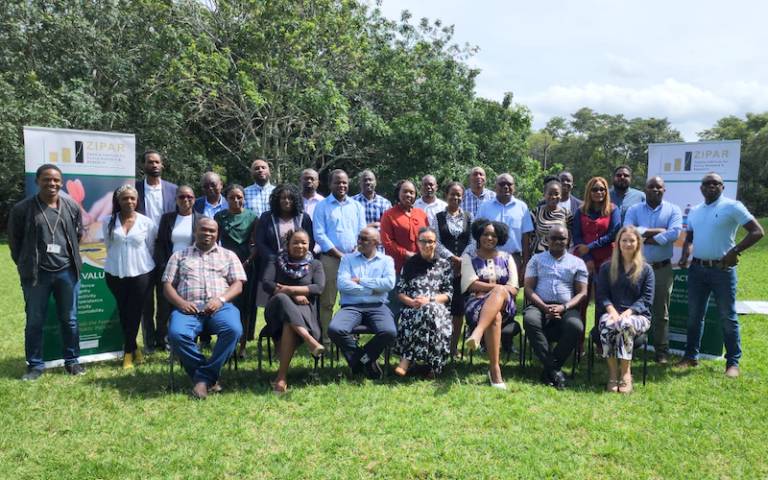Blog: UCL Institute for Sustainable Resources researchers co-host policy training workshop in Zambia
26 April 2023
Read Rebecca Clube's reflections on the recent two-day workshop in Zambia as part of the Climate Compatible Growth (CCG) programme

In collaboration with the Zambia Institute for Policy Analysis and Research (ZIPAR), the Climate Compatible Growth (CCG) programme hosted a capacity building training workshop for local stakeholders. The event brought together participants from public and private sectors to provide practical training on the policy process and the political economy factors that impact decision-making. The aim was to empower local actors with skills and knowledge so that they are well equipped to effectively engage in the policymaking process in Zambia. The two and a half day training took place at the picturesque Chaminuka Lodge, close to the capital city of Lusaka.
The participants represented a wide range of industries, including construction, transport, mining, consultancy, and information & communication technologies. They held diverse expertise and roles, ranging from technical experts in statistics and surveying, to legal and gender specialists. The wide spectrum of interests and sectoral coverage presented a unique opportunity for networking, collaboration, and debate.
The workshop involved seminars delivered by CCG researchers and collaborators; interactive group case study activities; and lively plenary discussions. There was even time to enjoy the facilities of the Chaminuka Lodge, such as a game drive and local produce tasting!
The first day set the scene with participant introductions as well as welcomes from the CCG programme and ZIPAR’s Executive Director, Dr Herrick Mpuku. Then, there were presentations on the topics of the complexities of decision-making for climate change (Bernard Tembo) and policymaking in the Zambian context (Mulima Nyambe). This was followed by a reflective discussion relating to the participants’ experience with the policymaking process in their professional capacities.
On the second day, there were lectures introducing policy theory and political economy factors (Cleopas Sambo, Meron Tesfamichael). In the afternoon, participants negotiated a real-life case study in groups. The case covered a historical food price shock, which may have been exacerbated due to extreme weather events in Zambia. Participants were tasked with identifying and analysing the political economy challenges that influenced the case’s outcomes, whilst brainstorming alternative policy pathways.
On the final day, a concluding seminar reflected on the workshop learnings and described some of the challenges and strategies for effective policy communication. This guidance aimed to provide real-life practical advice as to how policy issues can be navigated in practice. After, the Director at the Ministry for Green Economy & Climate Change and Chair of the African Group of Negotiators on climate change, Mr Ephraim Mwepya Shitima, arrived to deliver a keynote address. This invaluable presentation enabled the participants to learn first-hand about the climate priorities for Zambia and its role in wider regional and international decision-making. In particular, Mr Shitima reflected on the themes emerging from COP27, which was held in November 2022.
Finally, with support from the Minister and the ZIPAR Executive Director, the workshop concluded with an awards ceremony to present participants with certificates to recognise their participation in the training.
The workshop was well-received by the co-organiser and the participants. ZIPAR’s Mulima Nyambe shared her reflections:
The workshop was timely as Zambia since transitioning to a green economy. Understanding the policy process in both the ideal and Zambian context may enable state and non-state actors to understand their role in the policy making process to influence decision-making. The need to identify the influencers and champions including the beneficiaries is critical to ensuring that no one is left behind. Equipping state and non-state actors is prudent to ensure effectual influence in the decision-making process, and communication of policy recommendations.
There was also positive feedback from participants: Timothy Musole from the National Council for Construction (NCC) commented:
Coming from the construction industry, the training was insightful and very rich in content. ZIPAR did a good job in terms of the organization and the timings of the presentations. Learning about the political economy, the environment and other related subjects was really an eye-opener. As NCC, we look forward to more of such enriching capacity programs.
The organising committee are identifying opportunities to learn from this event with the intention that similar trainings can be run by the partner in the future.
Links
- To learn more about the Climate Compatible Growth programme, go here.
- To learn more about Rebecca Clube's work, go here.
 Close
Close

